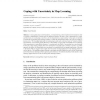Free Online Productivity Tools
i2Speak
i2Symbol
i2OCR
iTex2Img
iWeb2Print
iWeb2Shot
i2Type
iPdf2Split
iPdf2Merge
i2Bopomofo
i2Arabic
i2Style
i2Image
i2PDF
iLatex2Rtf
Sci2ools
111
click to vote
IJCAI
1989
1989
Coping With Uncertainty in Map Learning
In many applications in mobile robotics, it is important for a robot to explore its environment in order to construct a representation of space useful for guiding movement. We refer to such a representation as a map, and the process of constructing a map from a set of measurements as map learning. In this paper, we develop a framework for describing map-learning problems in which the measurements taken by the robot are subject to known errors. We investigate approaches to learning maps under such conditions based on Valiant’s probably approximately correct learning model. We focus on the problem of coping with accumulated error in combining local measurements to make global inferences. In one approach, the effects of accumulated error are eliminated by the use of local sensing methods that never mislead but occasionally fail to produce an answer. In another approach, the effects of accumulated error are reduced to acceptable levels by repeated exploration of the area to be learned. W...
IJCAI 1989 | IJCAI 2007 | Learning Problems | Map Learning | Probably Approximately Correct Learning |
Related Content
| Added | 07 Nov 2010 |
| Updated | 07 Nov 2010 |
| Type | Conference |
| Year | 1989 |
| Where | IJCAI |
| Authors | Kenneth Basye, Thomas Dean, Jeffrey Scott Vitter |
Comments (0)

